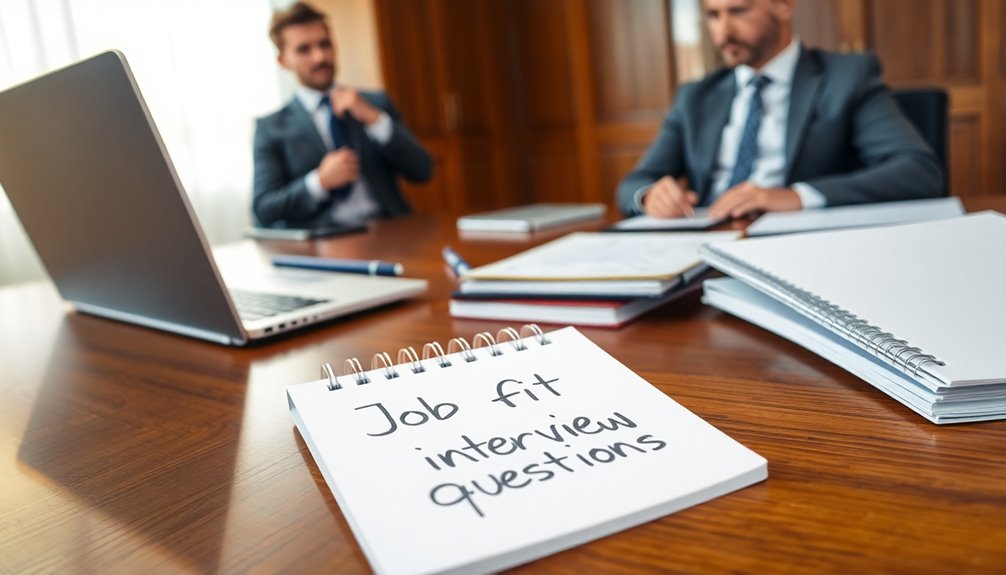To master the art of interview preparation, start by analyzing the job description. Understand what the employer values and align your skills accordingly. Research the company's history and culture to show you're genuinely interested. Prepare your personal motivations for the role and highlight your unique qualifications. Anticipate common interview questions and practice your answers, using techniques like the STAR method. Mock interviews can boost your confidence, so don't hesitate to enlist friends for help. Dress appropriately to create a strong first impression. Stay tuned for more tips that can further elevate your preparation game.
Key Takeaways
- Analyze the job description thoroughly to align your skills with the employer's qualifications and performance metrics.
- Conduct comprehensive research on the company's history, mission, products, and culture to demonstrate preparedness during the interview.
- Reflect on your personal motivations and unique qualifications to effectively convey enthusiasm and fit for the role.
- Prepare for common interview questions using the STAR method to structure your responses and highlight relevant experiences.
- Practice mock interviews with friends or family to improve articulation, pacing, and confidence under pressure.
Job Description Analysis

When analyzing a job description, it's crucial to thoroughly assess the qualifications and qualities the employer seeks. Start by reviewing the listed requirements and responsibilities in detail. Align your skills with what's mentioned, as this enhances your perceived qualifications.
Understand the performance metrics for the role; know what success looks like. Anticipate potential interview questions based on the job description content, as this prepares you to respond confidently.
Assess your personal fit for the role by reflecting on your experiences and values. Highlight the required skills you possess, and prepare to discuss relevant achievements that demonstrate your suitability.
This focused analysis will position you as a strong candidate, ready to impress during the interview process.
Company Research Techniques
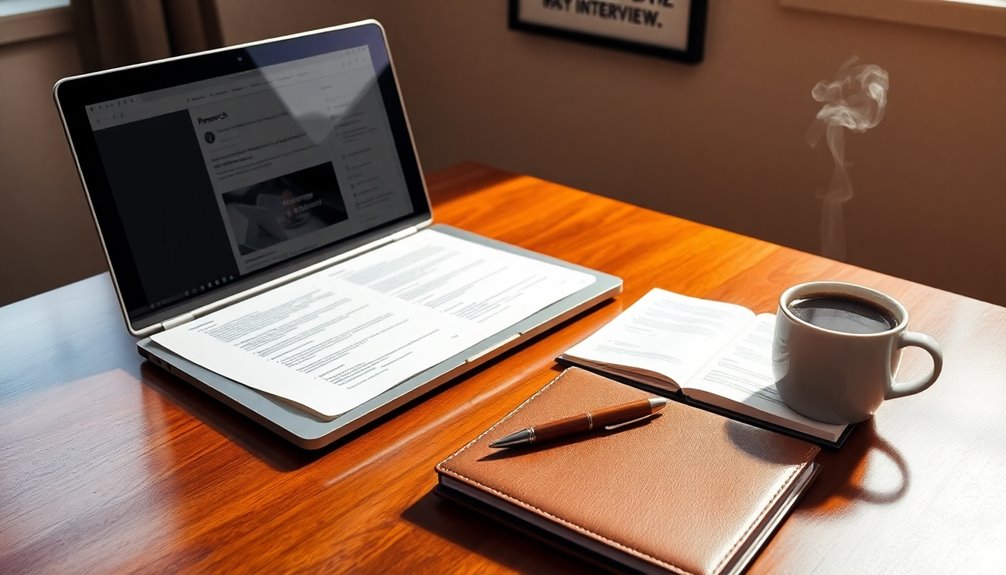
Conducting thorough company research is essential for successful interview preparation. Start by investigating the company's history, mission, and core values. Familiarize yourself with the products or services they offer and understand their market position and main competitors.
Keep an eye on recent news or developments to discuss during the interview, showing your up-to-date knowledge. Utilize social media and employee reviews to gather insights about the company culture. This understanding will help you assess whether you'd be a good fit.
Finally, being able to articulate this knowledge demonstrates your commitment and preparedness, setting you apart from other candidates. The more informed you are, the better you can tailor your responses and questions during the interview. Additionally, reflecting on small mistakes made in past interviews can enhance your performance and confidence in future opportunities.
Personal Motivation Insights
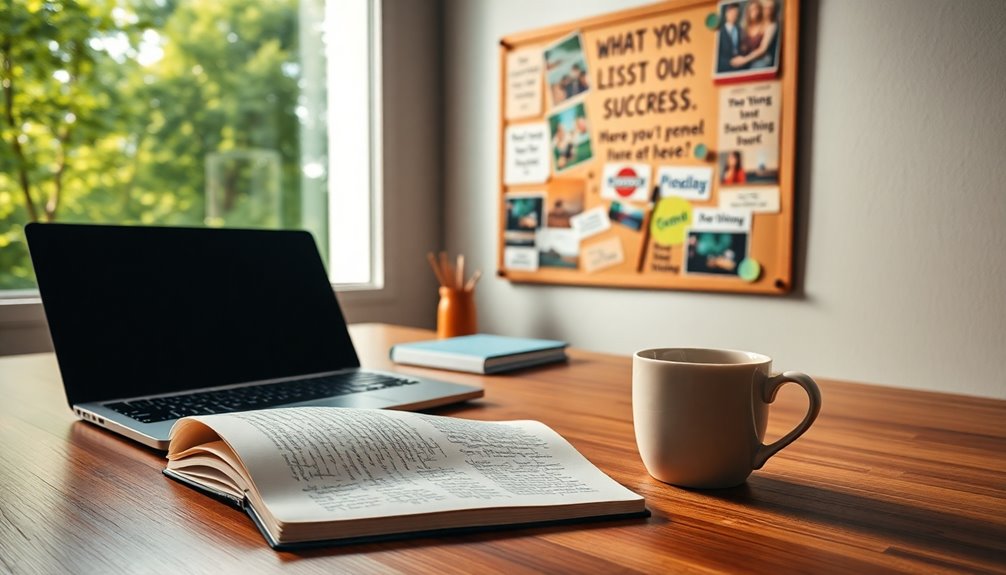
Understanding your personal motivation for pursuing a specific role is essential to effectively conveying your enthusiasm during an interview. Reflect on what drives you to apply for this position. Is it the opportunity to grow within a dynamic team, or perhaps the chance to contribute to a meaningful project? Identifying these motivations helps you articulate your passion for the role.
Additionally, pinpoint unique qualifications that set you apart from other candidates. Think about relevant experiences that showcase your skills and how they align with the company's goals.
Preparing Common Responses

Preparing for common interview responses is essential to making a strong impression. By anticipating frequently asked questions, you'll feel more confident and articulate during the interview.
Focus on these key areas:
- Behavioral questions: Use the STAR method (Situation, Task, Action, Result) to structure your responses.
- Strengths and weaknesses: Reflect on your personal strengths and how they align with the role, while presenting weaknesses as opportunities for growth.
- Elevator pitch: Craft a concise summary of your qualifications and career goals to introduce yourself effectively.
Mastering these responses not only showcases your skills but also demonstrates your preparedness and enthusiasm for the position.
Tailoring your answers to reflect the job's requirements can set you apart from other candidates.
Mock Interview Strategies
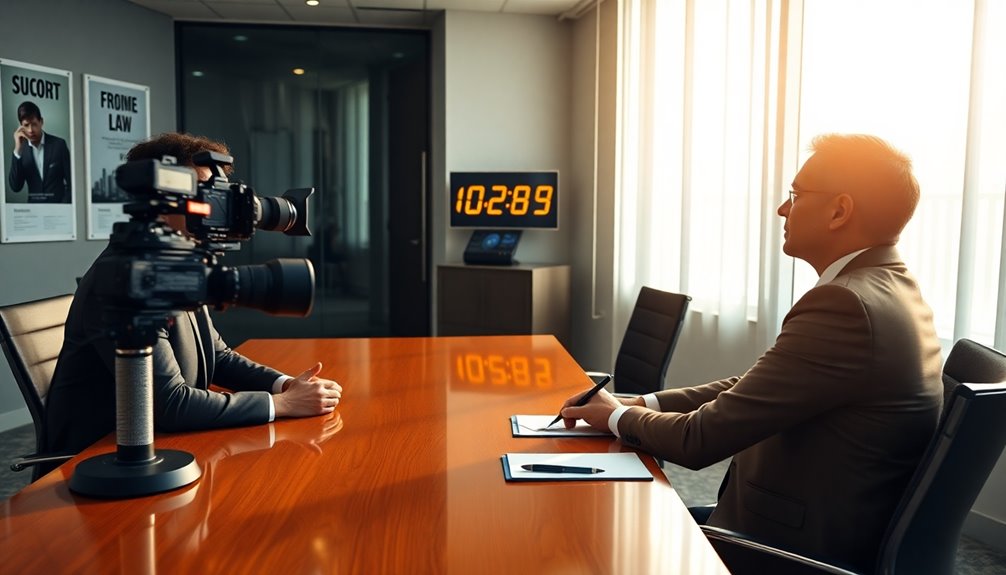
Mock interviews serve as a practical way to simulate the real interview experience, allowing you to refine your responses and build confidence.
Start by enlisting friends or family to conduct these interviews, providing a supportive environment. Use a timer to mimic the actual interview pressure, ensuring you practice your pacing.
Focus on common interview questions and tailor your answers to the specific job role. Record your practice sessions to review your performance, paying attention to body language and delivery.
Solo practice is also effective; rehearse your responses aloud to improve articulation. The more you practice, the more comfortable you'll feel, making it easier to present yourself authentically when the real interview arrives.
Questions for Your Interviewer
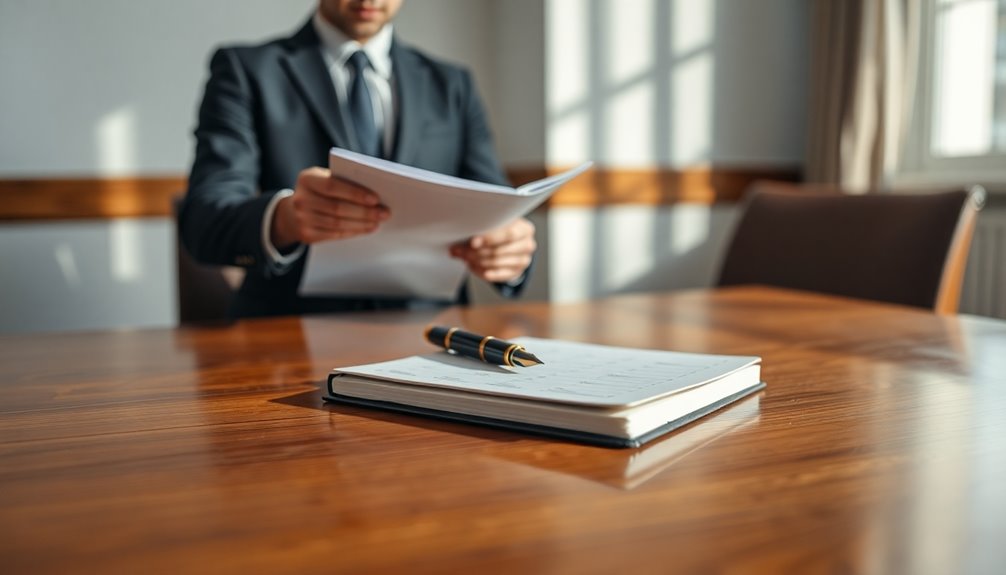
Asking thoughtful questions during your interview not only demonstrates your interest in the role but also gives you valuable insights into the company and team dynamics.
Preparing these questions shows that you've done your homework and are genuinely engaged. Here are some key areas to reflect on when formulating your questions:
- What's the team structure, and how does collaboration work?
- Can you describe the company culture and leadership style?
- What opportunities exist for professional development within the organization? Understanding financial metrics can also provide you with insight into the company's performance and priorities. Additionally, knowledge of ethical hacking principles can help you gauge the organization's commitment to security practices.
Furthermore, understanding company values can help you assess how well you might align with their mission and vision. It's also beneficial to inquire about retirement savings options that the company offers, as this reflects their commitment to employee financial well-being.
Dress for Success
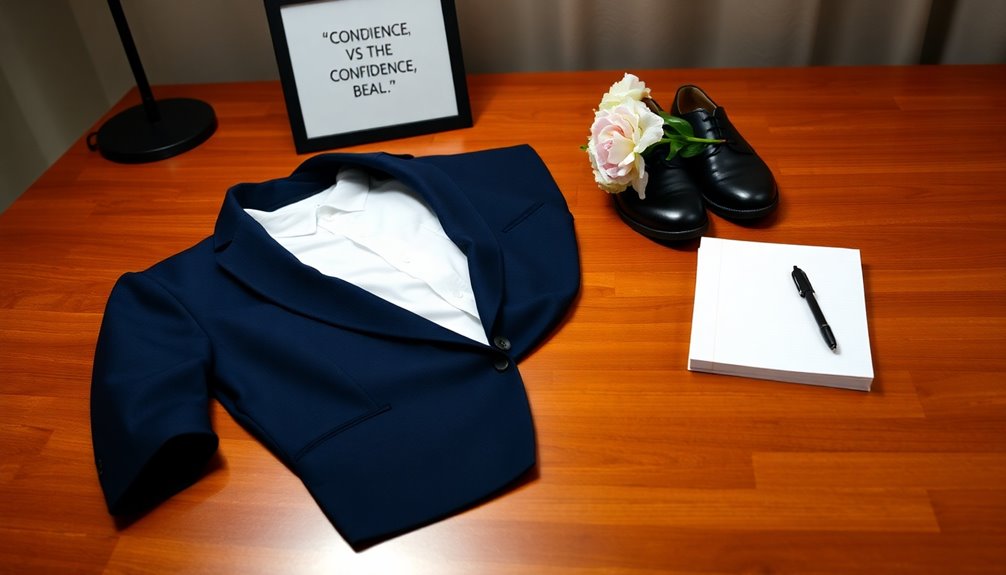
Dressing appropriately for an interview can greatly influence your first impression. When you arrive in professional attire, it signals respect for the opportunity and the company.
Research the company culture beforehand—some may favor formal wear, while others might embrace business casual. Confirm your clothes are clean, pressed, and fit well; ill-fitting clothing can be distracting. Additionally, embracing healthy boundaries can ensure you feel comfortable in your attire while presenting your best self. Consider investing in a best home security system for your home, as this can provide peace of mind while you focus on your career advancement.
Limit accessories to maintain a polished look, and pay attention to grooming—neat hair and subtle makeup can enhance your overall appearance. Additionally, consider opting for sustainable fashion choices that align with the growing emphasis on eco-friendly materials.
Managing Interview Anxiety

Managing interview anxiety is a common challenge many candidates face, and it can considerably impact your performance. To tackle this anxiety effectively, you can adopt several strategies:
- Practice relaxation techniques like deep breathing to calm your nerves.
- Visualize your success in the interview to boost confidence.
- Use positive affirmations to reinforce your self-assurance.
Preparation plays an essential role in minimizing anxiety. The more familiar you're with your material, the more confident you'll feel.
Conduct mock interviews, rehearse your responses, and make certain you know your resume inside and out.
Frequently Asked Questions
How Can I Improve My Body Language During Interviews?
To improve your body language during interviews, practice maintaining eye contact and using open gestures.
Sit up straight and lean slightly forward to show engagement. Avoid crossing your arms, as it can appear defensive. Smile genuinely and nod to show understanding.
You can also rehearse in front of a mirror to refine your movements.
Finally, be aware of your facial expressions; they should reflect your enthusiasm and confidence in the conversation.
What Should I Do if I Don't Understand a Question?
If you don't understand a question, don't panic—it's not like the interviewer is testing your psychic abilities!
Instead, take a moment to ask for clarification or to have the question repeated. This shows your willingness to engage and guarantees you provide a thoughtful response.
You could say, "I'm sorry, could you please elaborate on that?"
This approach not only buys you time but also demonstrates your commitment to understanding the conversation.
How Early Should I Arrive for an Interview?
You should aim to arrive at least 10 to 15 minutes early for your interview.
This gives you time to settle in, gather your thoughts, and assess the environment. It also shows respect for the interviewer's time and demonstrates your punctuality.
However, don't arrive too early, as it might inconvenience the interviewer.
Aim for that sweet spot to make a positive first impression and start off on the right foot.
Is It Acceptable to Discuss Salary Expectations in the Interview?
Yes, it's acceptable to discuss salary expectations during the interview, but timing is essential.
Wait for the interviewer to bring it up or until you've demonstrated your value. When the topic arises, be prepared with research on industry standards and your own needs. This shows you're informed and serious about the role.
What Should I Include in My Follow-Up Email?
In your follow-up email, you should express gratitude for the interviewer's time and insights.
Mention specific topics you discussed to personalize your message.
Reiterate your enthusiasm for the role and how your skills align with the company's needs.
If appropriate, include any additional information that supports your candidacy.
Finally, encourage them to reach out if they've further questions.
Keeping it concise and professional will leave a positive impression.
Conclusion
By mastering the art of interview preparation, you’re not just readying yourself for questions; you’re showcasing your skills, aligning your passions, and building your confidence. Engage with the company culture, articulate your motivations, and practice your responses. Prepare thoughtful questions, dress the part, and manage your nerves. With each step, you’re not just preparing for an interview; you’re paving the way for your next career opportunity. Embrace the process, and let your preparation shine! By mastering job interview introductions, you will be able to make a strong first impression and set the tone for the rest of the interview. Showcasing your enthusiasm and professionalism from the very beginning can leave a lasting impact on the interviewer. Practice introducing yourself confidently and succinctly, and be ready to make a memorable impression. With thorough preparation and mastery of job interview introductions, you will set yourself up for success in the competitive job market.




